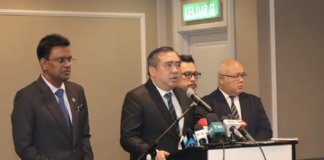PETALING JAYA, Sept 10: An expert in environmental law has spoken up against attempts to politicise the issue of water pollution, saying it is clear that the National Water Services Commission (SPAN), a federal body, is the primary authority for the protection of water supply.
Lawyer Derek Fernandez said the Water Services Industry Act 2006 (Wasia) gave SPAN executive authority to manage and protect public water supply, including substantial police-like powers to investigate and enter premises for checks.
He said state governments, including Selangor, had given Putrajaya the power under Wasia, which was passed under clause 1 of Article 74 and clause 2 of Article 80 of the Federal Constitution, as the primary authority charged with this responsibility.
“For example, if you or I were to tamper with the water pipe from outside our house going into our house, bypassing the water meter, we will be prosecuted by a federal authority, not a state one,” he told FMT when commenting on the recent water disruption caused by the pollution of Sungai Selangor.
Fernandez said the Environmental Quality Act 1974 is a federal legislation which places the power to prevent and control pollution, including that of water, in the hands of the federal government.
“So, it is unfair to push the responsibility for the protection of water pollution solely to the state government as states have agreed that the power to do this be given to a federal authority.
“In fact, Environment and Water Minister Tuan Ibrahim Tuan Man has correctly said that stern action will be taken against the Sungai Selangor polluter under Wasia and Environmental Quality Act,” he said.
Fernandez said Putrajaya must ensure that SPAN has sufficient budget, resources and manpower to do its job, including monitoring pollution risk and enforcement.
On top of that, he said, Putrajaya should amend Wasia to provide affected consumers with the legal right to claim damages for water disruptions caused by intentional pollution.
“The legislation should provide a minimum rate for each day of disruption, payable by the polluter and not the water service provider,” he said.
A minimum compensation of RM1,000 a day to each consumer, he said, will act as a huge deterrent to would-be polluters as they could easily face bankruptcy.
Fernandez said while SPAN is the primary authority where the protection of water supply is concerned, state governments also have a responsibility to do so.
“LUAS (the Selangor Water Management Board), for example, is empowered under the LUAS enactment to license and control discharge into water supply.
“Local authorities have the power and responsibility to prevent illegal factories from operating or abetting in causing a nuisance and controlling river pollution within their jurisdiction,” he said.
In this respect, Selangor Menteri Besar Amirudin Shari made the right move in using the National Land Code and powers to demolish illegal factories to see that the land occupied by the alleged polluter of Sungai Selangor is vacated and the factory demolished, he said.
“In fact, both forfeiture and demolition are equally potent weapons against air pollution caused by open burning and the problem of abandoned buildings, both plaguing many cities and areas in Malaysia.
“Hopefully, these remedies will also be similarly used to effectively deal with all public health and safety threats.”
To enhance the effectiveness of the forfeiture, Fernandez said, state governments should request the National Land Council to consider certain amendments to the NLC to cover existing loopholes.
One such loophole is that the NLC does not cover a polluting factory operating legally on industrial land.
“The states can seek an amendment which allows for forfeiture of land where land is used in violation of local plans and zoning for an activity which poses a serious risk to public health and safety,” he said.
Elaborating on what state authorities could do, he said the state governments can take more effective enforcement measures and also rezone areas critical to the preservation of water supply.
“They can prohibit certain classes of activities that pose a high risk to the water supply, even if they are legal activities,” he said.



















